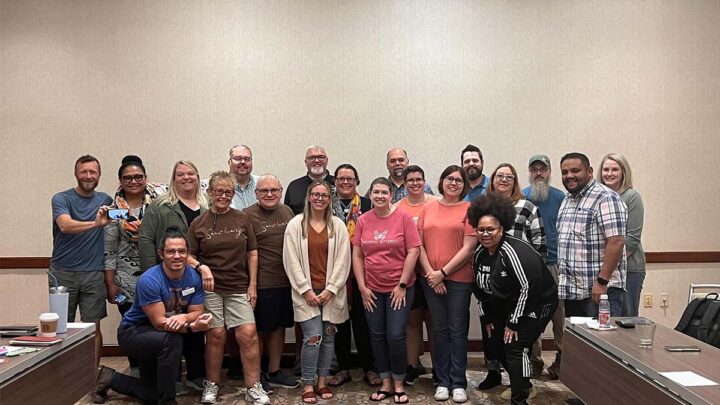On September 26-28, the Rev. Jason Villegas, our Conference Director of Youth Ministry, went to a gathering of other youth ministry leaders from other United Methodist Annual Conferences. He reflects on the gathering in this series of posts.
“We don’t inherit the land from our parents, we borrow it from our children.” – Native American Proverb
Like protons and electrons arguing while staying in relationship, swirling around in harmony, my emotions – opposite yet deeply attracted – did their dance while I sat like a passive neutron, taking up mass and present to it all. Joy and isolation met. Hope and despair kissed. Happiness and anger held hands.
Like the turbulence of the airplane that I took to get to the National Young People’s Ministry gathering in Kansas City, my emotions would uplift me one moment and drop me the next. Emotions are data. They tell our brains, through the sometimes annoying habit of hijacking our bodies, what is going on. We can ignore some emotions, but it is hard to ignore the sensation of a brain-load of cortisol being dumped into the bloodstream when it is time for bed. That is why we call them “feelings.”
People often ask, “What keeps you up at night?” This week it was a constant array of emotions that surfaced while looking at Youth Ministry in the United Methodist Church through the eyes of my counterparts – directors and leaders of youth ministry in their Conferences, ranging from roughly 500 to 1,000 each.
Outside of the room in which we met, an organization worth tens of billions of dollars met to have its leadership summit. We watched as stone-faced, mostly older white men walked in social step with each other, their three-piece suits blended together but trying to stick out like the tail feathers of a flock of roosters.
“I bet the rungs are rough on that corporate ladder,” I thought. It’s interesting to see so much power concentrated in so many older men at the same time when we were trying to think of inclusion and diversity among youth.
The United Methodist Church had one thing in common with this secular business institution, though. We were both aware of what it was like to be relatively robust and homogenous. The challenge for the UMC, though, is that Christianity, as a social force, is waning in power (Christofascism aside).
We talked, among other things, about the history of youth ministry. Many congregations used to have youth pastors, but now many experts would recommend against that approach for the average churches that are not able to pay a youth worker a living wage nor adequately support them in the unending rigors of youth ministry. (We all wish that churches had the resources to do these things but realize most do not.)
As we realized the fall in prominence of the Christian church in the United States, among the overarching tidal wave of secularity, we also thought about the possibility that our jobs might not be around for long. Many of us, myself included, occupied halftime positions that were once full-time.
Looking to the future, we thought intensely about what our tasks might be. Should we use the time we have trying to revive youth ministry? Should we spend it resourcing volunteer youth ministers and youth as leaders since they will lead if our positions cease to exist? Should we become entrepreneurs, seeing what might emerge as a new way of being? Does the answer lie in a mix of these or something else?
Thinking about Generation Z and the emerging Generation Alpha (named as such because they are the first generation entirely born into this new millennium), we realized how their ability to thrive will not lie in memorizing answers for tests but in asking creative questions and sitting in wonder and creativity. Maybe you can see how the pendulum of emotions swung so quickly for me. Maybe it does for you too?
Parts 2 and 3 of Jason’s reflection will be posted in the coming weeks.
Read Part 2 and Part 3

